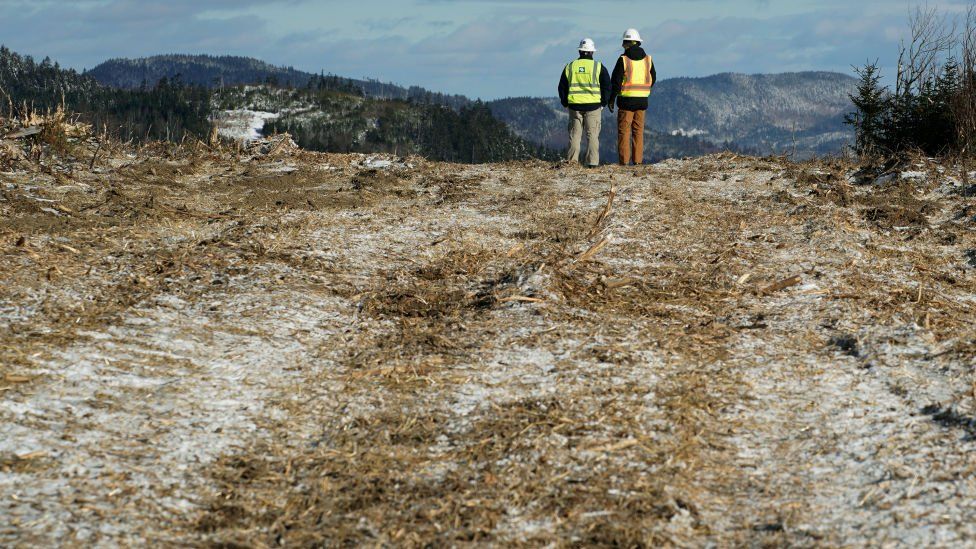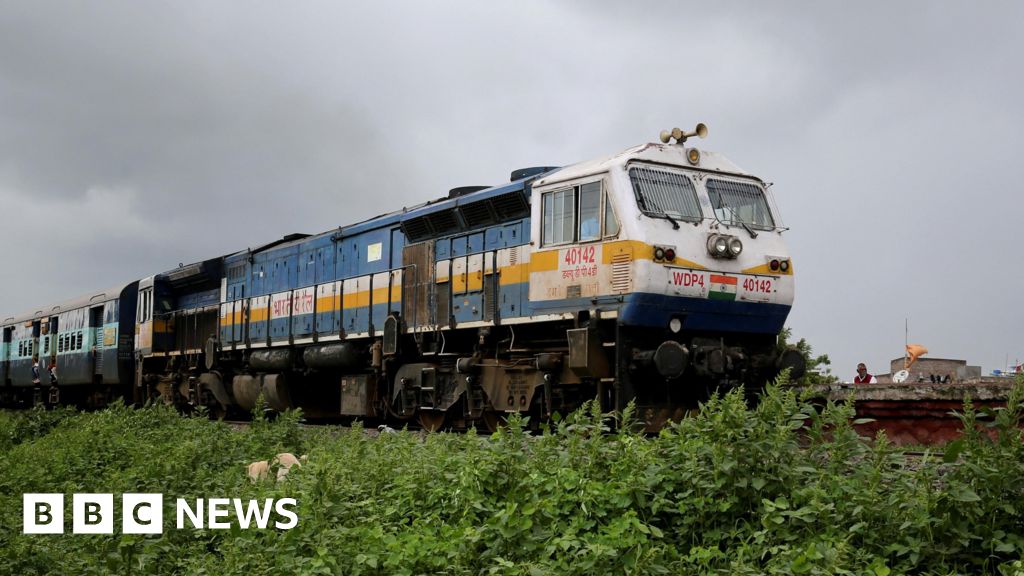ARTICLE AD BOX
By Robin Levinson-King
BBC News
 Image source, Getty Images
Image source, Getty Images
A portion of the NECEC corridor
A proposal to transport clean hydropower from Canada to the state of Maine has created enough "hoohah" to launch a fierce court battle - possibly signalling trouble for the future of green energy projects across the US.
New England Clean Energy Connect (NECEC) was supposed to be an industry-leading project, transporting 1,200 megawatts of Canadian hydropower to Massachusetts across 145 miles (233 km) of transmission line, and eliminating over three million metric tonnes of carbon emissions every year.
The $1bn (£840m) project, funded by utility company Hydro-Quebec and Central Maine Power (CMP), which is owned by the Spanish energy giant Avangrid, received final approvals, including a Presidential Permit from the US Department of Energy. Construction began in January 2021.
Now, the hydropower project could be dead in the water, after a majority Mainers voted to cancel it last November.
The legality of that referendum, as well as the lease for a one-mile stretch of public lands, is currently before the Maine Supreme Court, which could issue its decision any day.
If the court sides with opponents, and the corridor is not allowed to proceed as planned, Hydro-Quebec could lose out on $10bn in future revenue from this project.
It could also signal trouble for the future of other clean energy projects in the US, at a time when many states are trying aggressively to green their power grid to offset the effects of climate change and rising fuel costs.
"We can't succeed if every wind project, every solar energy project, every hydro project… is going to become challenged," said Orlando Delogu, a professor emeritus at the University of Maine School of Law who supports the corridor and has worked as an advisor in the fight over the project.
Image source, Getty Images
Image caption,Former state senator Tom Saviello has been a longtime opponent of the project
But the project received pushback from the start. Tom Saviello, a former state senator, got involved with the opposition in 2018.
"For that kind of deal it wasn't worth it. I wanted Maine to be treated right and it weren't," he said. "We're giving up a lot for getting nothing."
In Maine - a state where some say you're not considered a local unless you were born there - he was wary of a project that seemed chiefly geared to benefit a Canadian utility and the state's southern neighbour of Massachusetts, which signed a 20-year contract with NECEC's backers to receive the bulk of the power.
The project did include a plan that would help power about 70,000 Maine homes, providing a $2.72 reduction in monthly energy bills.
Those in opposition have disputed the benefits and monthly savings estimate, arguing it would be pennies.
About two-thirds of the corridor would build on existing transmission lines, with an extension planned to run 53 miles through Maine's North Woods, including the short stretch through public land being contested in court.
Proponents of the project say it is the shortest route and most environmentally sound way to connect Quebec, where the hydropower is generated, to Massachusetts. It received all necessary approvals, and independent analyses of the proposal found it would reduce emissions in the region.
But several environmental groups have expressed concern about the ecological impact on the North Woods, and have called into question whether the energy will be as clean as advertised.
Mr Saviello also said it didn't help that Hydro-Quebec had partnered with CMP, which has had a number of public relations gaffes in the state, including allegations of overbilling and major outages.
Market research firm JD Power has ranked the company dead last out of 88 utilities in the US for customer satisfaction.
"They have a lousy reputation," Mr Saviello said. "Do you want somebody like that running a big project like that?"
In a statement, CMP said it has a record of success on major energy projects, including completing the the largest transmission project in Maine on time and under budget in 2015 - and that has improved customer service.
"We continue to hold ourselves accountable to these standards," said Catharine Hartnett, manager of corporate communications.
Image source, Getty Images
Image caption,Maine's North Woods is home to important wildlife, as well as a thriving forestry industry
Construction on the corridor began despite court challenges. Meanwhile, opponents were mounting a legislative challenge with a state-wide referendum on whether the project should be allowed to go forward.
It all came to a head last winter, when over 400,000 Mainers turned up to cast their vote, no small feat in a state whose total population is just 1.3 million. It was the second-highest voter turnout on a referendum in the state's history, surpassed only by the 2012 referendum on gay marriage.
People on both sides of the debate lobbied aggressively to make their case. By the time the issue came to voters, it was the most expensive ballot question in the state's history.
In total, the referendum battle cost over $100m, according to the Maine Ethics Commission, which tracks political spending. Those in favour of the project raised about $82m, mostly coming from Avangrid, Hydro-Quebec and CMP.
Some of the biggest donors to the opposition came from fossil-fuel companies. Energy firm NextEra gave over $20m, most of which was spent on television advertising. While the company supplies green energy elsewhere, in Maine it mostly delivers oil and gas. NextEra did not respond to a request for comment.
In total, opponents to the project spent twice as much on television advertising than the supporters.
That proved deadly for the corridor campaign, said law professor Mr Delogu.
"That creates a lot of hoohah in a small state," he said.
He blames lobbying from fossil-fuel competitors for the project's demise in the polls.
"There's not a corner of the world that isn't being adversely affected by global warming, and it's getting worse at an accelerating rate in many places because we're unable to push back against the fossil fuel interests," he said.
After spending about $450m already on construction, work ground to a halt.
Image source, Getty Images
Image caption,One of Hydro-Quebec's dams, which helps generate power
Nationwide, electricity transmission systems need to expand by 60%, according to the US Department of Energy, if the country is to meet President Joe Biden's goal of reaching 100% clean electricity by 2035.
Lawrence Berkeley National Laboratory, supported by the Department of Energy and managed by the University of California, estimates there are enough proposed clean energy projects seeking access to the transmission grid to power most of the country's energy needs - if they can connect.
The fact that so many projects are in the queue means the grid needs additional capacity, said Joe Rand, senior scientific engineering associate at the lab. Improving and streamlining the approval process for these projects would also help reduce backlogs.
There have also been fewer new transmission lines built, despite demand, than before.
"There's kind of a fundamental disconnect," Mr Rand said. "We need to be building more transmission, and we're actually building less."
Public opposition to these projects, as well as regulatory red tape, is often a roadblock, and contributes to the long development time needed to get a project completed, he said. It can take 15 years from start to finish.
Before launching the project in Maine, Avangrid and Hydro-Quebec tried, and failed, to get permits to launch a similar project in the neighbouring state of New Hampshire.
Mr Saviello, and many other Maine opponents to the NECEC project, have suggested Massachusetts should connect through Vermont, which has permits to build a transmission corridor underground.
He said that just because Mainers have said they don't want this project doesn't mean they are opposed to clean energy.
Although the Maine corridor is not without its costs, both economic and environmental, Mr Delogu said the benefits far outweigh the negatives.
"I think we need to come to grips with that, or we will continue to be overtaken by global warming," he said.

 2 years ago
79
2 years ago
79








 English (US) ·
English (US) ·